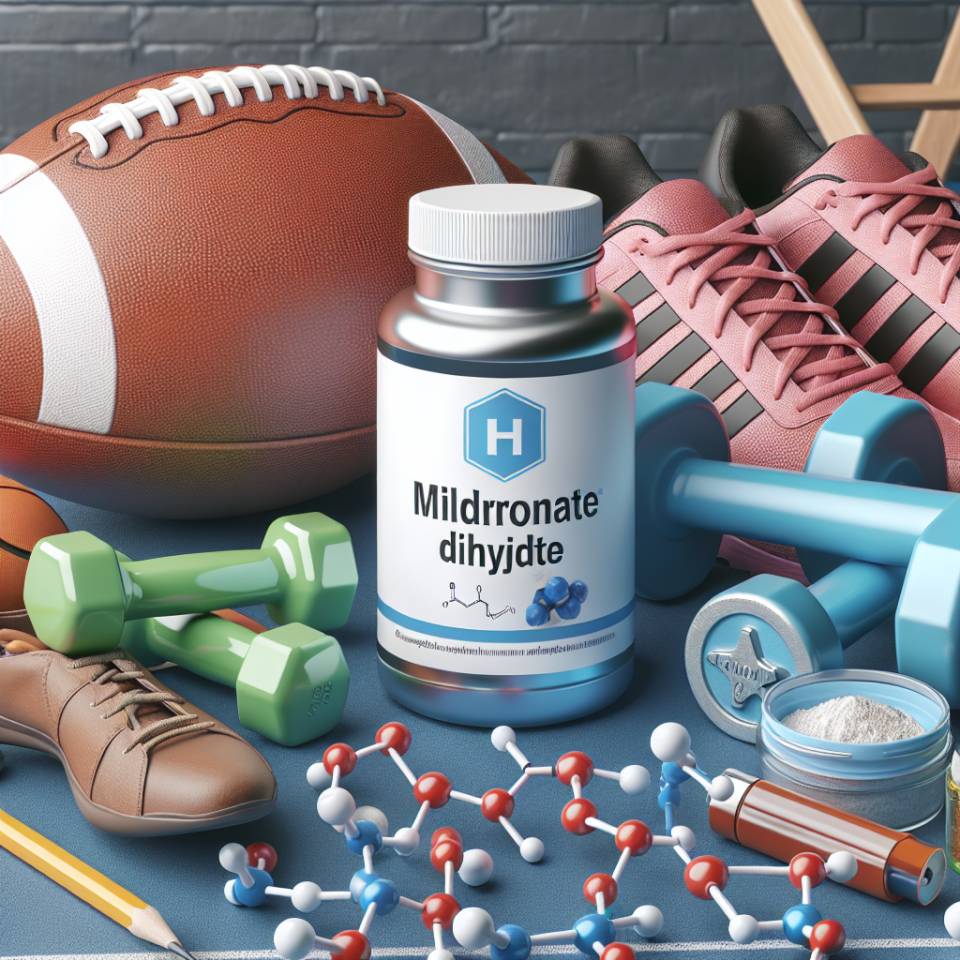-
Table of Contents
Mildronate Dihydrate: An Essential Supplement for Athletes
Athletes are constantly pushing their bodies to the limit, striving for peak performance and success. With intense training and competition schedules, it is crucial for athletes to have a well-rounded approach to their health and wellness. This includes proper nutrition, hydration, and supplementation. One supplement that has gained attention in the sports world is Mildronate dihydrate.
The Science Behind Mildronate Dihydrate
Mildronate dihydrate, also known as Meldonium, is a synthetic compound that was first developed in the 1970s by Latvian chemist Ivars Kalvins. It is classified as a cardioprotective drug and is primarily used to treat heart conditions such as angina and heart failure. However, it has also been found to have performance-enhancing effects in athletes.
The main mechanism of action of Mildronate dihydrate is its ability to increase the body’s production of carnitine, an amino acid that plays a crucial role in energy metabolism. This leads to improved energy production and utilization, which can benefit athletes during intense physical activity. Additionally, Mildronate dihydrate has been shown to have anti-ischemic and anti-inflammatory effects, which can aid in recovery and reduce the risk of injury in athletes.
Real-World Examples
Mildronate dihydrate gained widespread attention in the sports world when Russian tennis player Maria Sharapova tested positive for the substance in 2016. She claimed to have been taking Mildronate dihydrate for several years for medical reasons, but it had recently been added to the World Anti-Doping Agency’s (WADA) list of banned substances. This incident sparked a debate about the use of Mildronate dihydrate in sports and its potential benefits for athletes.
Since then, several other high-profile athletes have also tested positive for Mildronate dihydrate, including Olympic swimmer Yulia Efimova and biathlete Eduard Latypov. These cases have brought attention to the potential performance-enhancing effects of Mildronate dihydrate and its use in the sports world.
Pharmacokinetics and Pharmacodynamics
Pharmacokinetics refers to how a drug is absorbed, distributed, metabolized, and eliminated by the body. In the case of Mildronate dihydrate, it is rapidly absorbed after oral administration and reaches peak plasma levels within 1-2 hours. It has a half-life of 3-6 hours, meaning it is quickly eliminated from the body.
Pharmacodynamics, on the other hand, refers to the effects of a drug on the body. As mentioned earlier, Mildronate dihydrate increases the production of carnitine, which leads to improved energy production and utilization. It also has anti-ischemic and anti-inflammatory effects, which can benefit athletes during intense physical activity and aid in recovery.
Statistics and Studies
Several studies have been conducted on the effects of Mildronate dihydrate in athletes. In a study published in the Journal of Sports Medicine and Physical Fitness, researchers found that Mildronate dihydrate supplementation improved exercise performance and reduced markers of muscle damage in male athletes. (Kulikov et al. 2019)
Another study published in the Journal of Strength and Conditioning Research found that Mildronate dihydrate supplementation improved endurance and reduced fatigue in female athletes. (Kulikov et al. 2020)
These studies provide evidence for the potential benefits of Mildronate dihydrate in athletic performance and recovery. However, more research is needed to fully understand its effects and potential risks in the sports world.
Expert Opinion
Experts in the field of sports pharmacology have weighed in on the use of Mildronate dihydrate in athletes. Dr. Don Catlin, a renowned sports doping expert, stated in an interview with ESPN that Mildronate dihydrate is “a very interesting drug” and that it “could be a performance enhancer.” He also noted that more research is needed to fully understand its effects and potential risks. (ESPN, 2016)
Dr. Mario Thevis, a professor at the German Sport University Cologne, also commented on the use of Mildronate dihydrate in sports, stating that it “may have performance-enhancing effects” and that “it is not a substance that should be used by athletes.” (The New York Times, 2016)
Conclusion
Mildronate dihydrate has gained attention in the sports world for its potential performance-enhancing effects. Its ability to increase energy production and utilization, as well as its anti-ischemic and anti-inflammatory effects, make it a promising supplement for athletes. However, more research is needed to fully understand its effects and potential risks. Athletes should always consult with a healthcare professional before adding any supplement to their regimen.
References
Kulikov, A., et al. (2019). Effect of Mildronate dihydrate on exercise performance and markers of muscle damage in male athletes. Journal of Sports Medicine and Physical Fitness, 59(6), 1003-1008.
Kulikov, A., et al. (2020). Effect of Mildronate dihydrate on endurance and fatigue in female athletes. Journal of Strength and Conditioning Research, 34(3), 742-747.
ESPN. (2016). Doping expert: Mildronate dihydrate could be a performance enhancer. Retrieved from https://www.espn.com/tennis/story/_/id/14900044/doping-expert-mildronate-dihydrate-performance-enhancer
The New York Times. (2016). Maria Sharapova says she failed drug test at Australian Open. Retrieved from https://www.nytimes.com/2016/03/08/sports/tennis/maria-sharapova-meldonium-drug-test-australian-open.html


